30th July 2024. The hilly terrains of Wayanad in Kerala, India, witnessed one of its most devastating landslides. Over 15,000 people lost their homes, and more than 100 relief camps were set up. What followed was an extraordinary human response. Thousands of volunteers, government aid, NGOs and donations were assembled. With the sheer scale of this emergency, there was a need for coordination, structure and transparency. We, at Faircode Infotech, knew that this was the time to step in. ERPNext was our best bet at organising this chaos.
A lightning-fast decision
31st July 2024, 9:00 AM. I called the Wayanad District Collector.
“We want to deploy ERPNext for relief operations, free of cost. So we can help bring transparency to these rescue and relief operations.”
9:15 AM, she approved and by 9:30 AM, Faircode assembled four of their most capable teammates. People who had deep functional and development knowledge. The dream team, Shiyas, Nipun, Nakul and Sridharshan, converged at Wayanad from across Kerala. While our backend team created a new ERPNext instance, we knew that this was going to be a challenge. Achieving transparency at this scale and within the bureaucratic framework was going to be daunting.
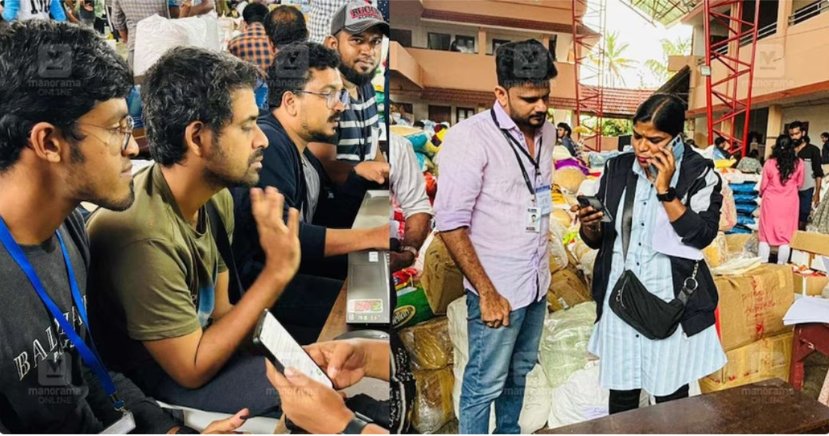
First day in Wayanad: Setting up
As we drove towards Wayanad that night, our car became a war room. We mapped out everything that might go wrong. From connectivity issues, to missing item standards and the possible lack of hardware. We had packed everything we could, including routers, printers and laptops.
We reached by midnight. By 6:00 AM, we were live at the first warehouse.
On the ground
What we saw was both unexpected and overwhelming. Donations were flooding in but were recorded without any naming standards or tracking processes. For example, ‘Rice’, ‘Raw Rice’ and ‘Rice Bag’ were all labels for the same item. All this, with no distribution records. Our first step was to create a consolidated, clean item master in ERPNext.
How we built trust in the system
Setting up a system is one task. Asking everyone to use it with conviction is another. For the system to work in such a delicate situation, there needed to be collective faith. What actually lifted the hesitation was an incident involving chilli powder. On day 1 of the ERPNext implementation at the relief warehouse, we cleaned up all the messy data, consolidated records and logged all the donations made on that day.
The next day, a volunteer casually asked us, “How much chilli powder is in that godown? Don’t check, tell me from your system.”
“14 kilograms.” I replied. The volunteer proceeded to check and came back with a bag and said, “Exactly 14 kilograms”.
There was an uncharacteristic silence. And then a sense of belief. From that moment on, the energy changed. Volunteers, staff, and even government officers began trusting ERPNext and Faircode.
The real heroes
This endeavour wasn’t just about the system, it was the people too. Volunteers showed up daily at 6:00 AM and worked till midnight, lifting, loading, sorting, stacking and entering data. Not a single one resisted the tech. They followed our guidance and worked with a discipline that humbled us.
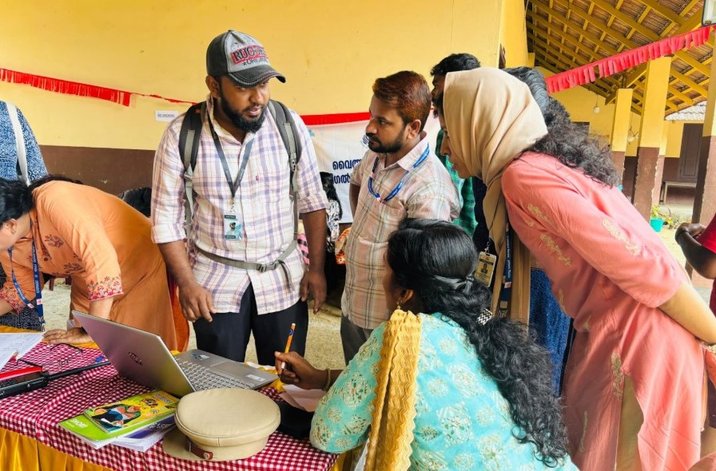
Making the system work with collaboration
As ERP consultants, we often face resistance from data entry teams. This comes from a fear of change, lack of training or even an attachment to old systems. Although here, even clerical government staff were eager to learn. Their open-mindedness showed quick returns. Workloads reduced within hours, and we earned some of or biggest advocates.
Higher officials like the Tahsildar and Deputy Collector personally told us that ERPNext helped them instantly answer stock movement queries from the Revenue Department and even the Ministry. Requests that would have taken days were fulfilled in minutes.
The technology behind this
The Faircode team had rapidly customised ERPNext for disaster relief needs. Here’s what we implemented.
- Inventory collection & purchase entry: We ensured that every donation is entered into the system as a purchase.
- Stock transfers to camps: We set up request-based stock transfers using streamlined workflows.
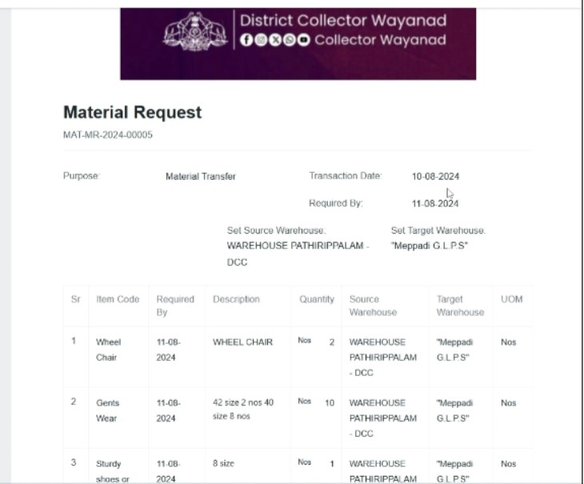
- Camp distribution tracking: A simple UI for volunteers to record item distributions.
- Quantity-only tracking: Removing the headache of prices
- Donor acknowledgements: Real-time receipts and contribution tracking
- Public dashboard: A live page showing shortages and inventory, shared with the public and media
- Urgent needs visibility: Automatically surfacing stock statuses as “Urgently Needed” items on the public dashboard
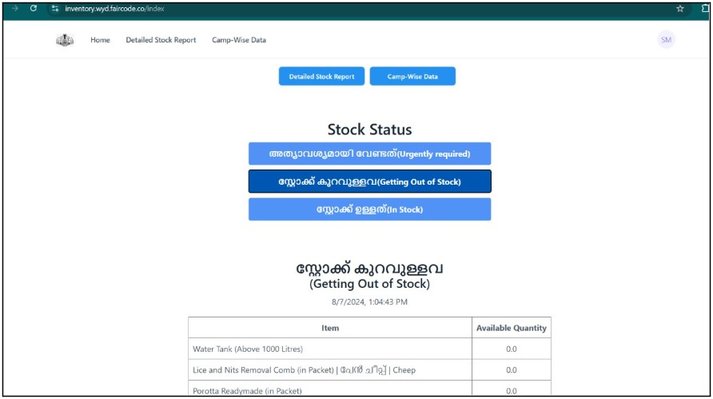
- RTI-Friendly reporting: We made accurate historical records available for audits and public queries
These implementations saved valuable time. Earlier, the revenue staff would work late into the night trying to reconcile Excel sheets. Even then, actual stock never matched the reports. With ERPNext, the finished in the evening and the physical inventory would perfectly match the records. Accuracy brought peace, and peace bult trust.
Creating impact
Many incidents strengthened the belief in the viability of the system we set up. One night, a school teacher arrived with a lorry full of donated goods. He was worried because he needed proof of donation for PTA audit purposes. Within minutes, we created a custom receipt on the department letterhead, signed by the Deputy Collector. His gratitude was unforgettable.
Another day, a critical water shortage hit one camp. We didn’t need to reach out to individual donors or the press. We created a material request in ERPNext. This instantly highlighted the item on the public dashboard. The next morning, a truck full of 1500 litre water tanks rolled in.
The power of transparency
Weeks later, after the stock had been distributed, ERPNext still continued proving its worth. Requests under the Right to Information Act were fulfilled quickly with grouped date-based data in ERPNext. There was no room for doubt and contributors were assured that their donations were used right. During Legislative Assembly meetings, the opposition would raise concerns about expired food. Our stock reports became undeniable proof, ERPNext spoke louder than politics.
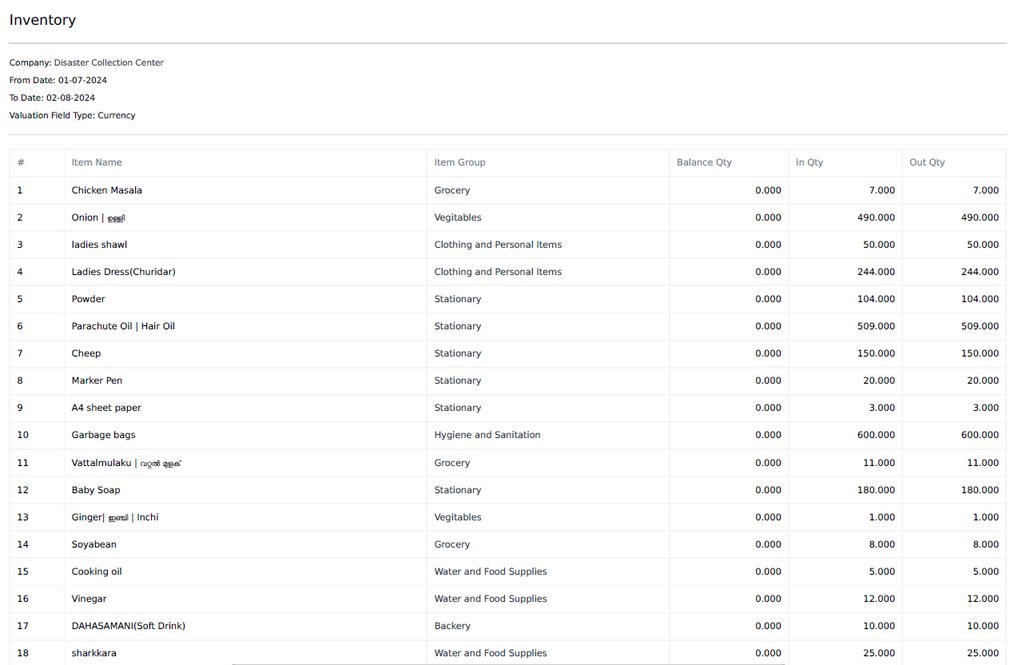
The fastest ERP implementation of all time
Our challenge was to implement with speed. But this story was also one of people, purpose and public trust. ERPNext was managing the data fueled by hope. The system offered instant acknowledgement of contributions, live inventory insights, shortage transparency and audit friendly reports. This was a zero-cost implementation for the government that enabled data-driven decisions in situations that mattered most.
In under 24 hours, we launched a live ERP system that powered relief operations across 100+ camps. It ran for months, quietly doing its job while letting humans did theirs.
This case study illustrates how rapid implementation of an ERP system can transform disaster response efforts by ensuring efficient management of relief materials while maintaining transparency and public trust during critical times.
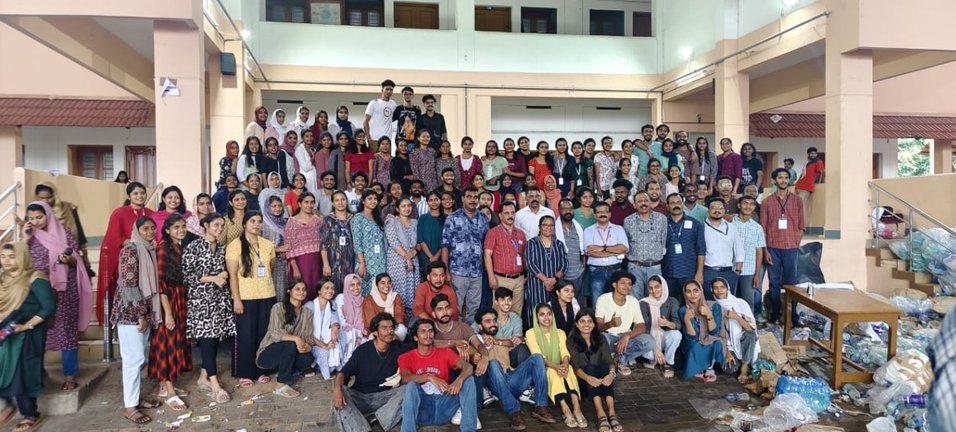
A picture after clearing all stock from the first collection centre
Credits
- The District Collector, Revenue Department, youth volunteers and the people of Wayanad. Thank you for trusting us.
- The Faircode team, Shiyas, Nipun, Nakul & Sridharshan. You not only deployed a product, but stood shoulder to shoulder with people in crisis.
- The ERPNext & Frappe community. You’ve built something bigger than software, you’ve built a movement.
Watch the story in a video here.




·
Congratulations and Felicitations for your beautiful work and dedication. This is how mordern technology is used for real human benefit and well-being. All the Best to All!
·
Great initiative ✨
·
Great
·
A much-needed implementation by team Faircode! Rajith, Shiyas, Nipun, Nakul, and Sridharshan!!
·
Great Work and Great Support to Kerala people!! Wow!! what a great work 👏 ✨ Shreyas⭐, Nipun⭐, Nakul⭐ and Sridharsha⭐!!🇮🇳
·
Kudos to the whole team 👏
·
Great work ❤️
·
🙌❤️
·
Great work 👏
·
Great work🙌🏻